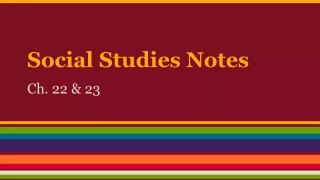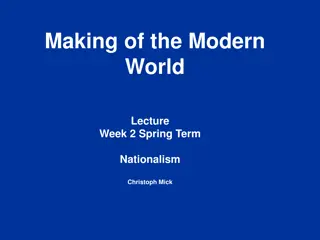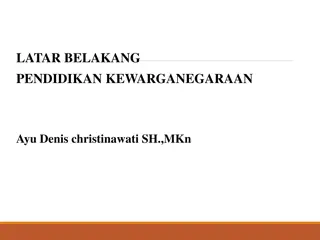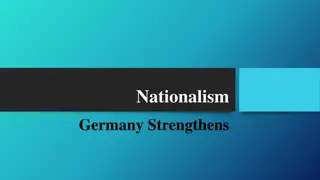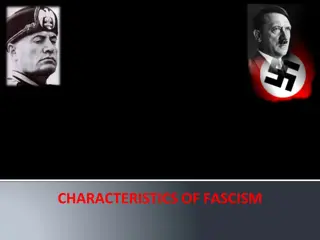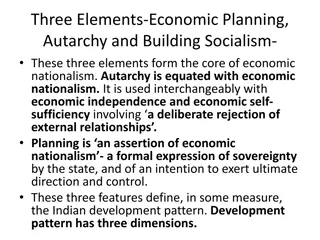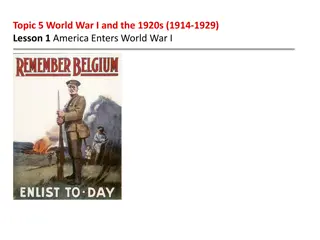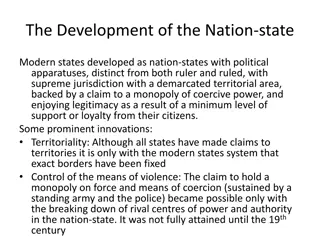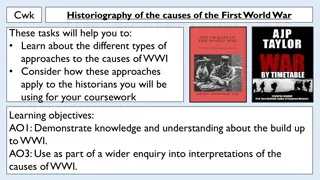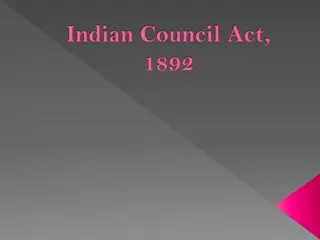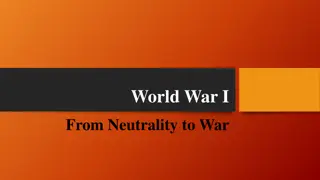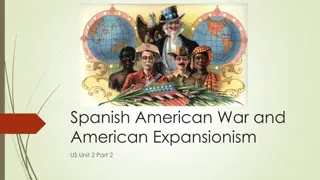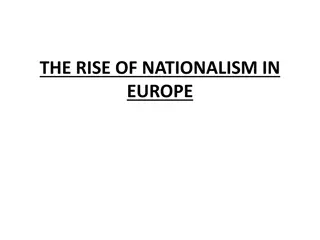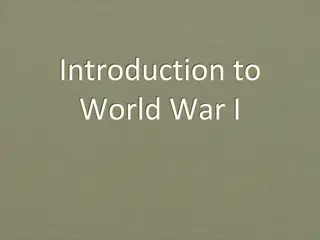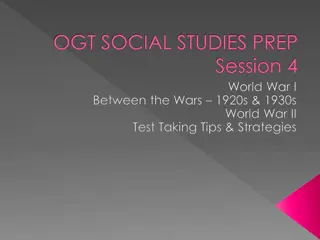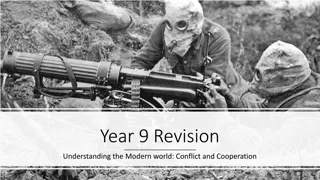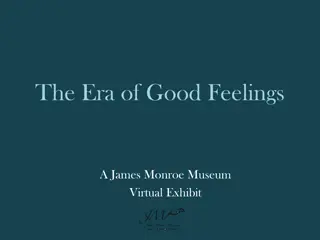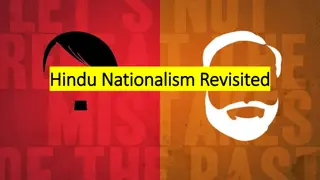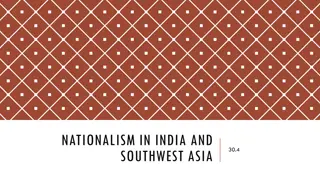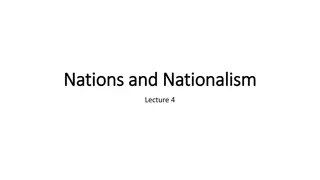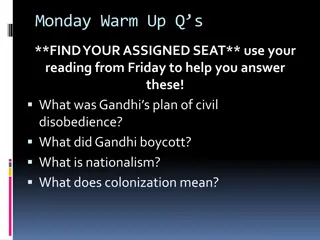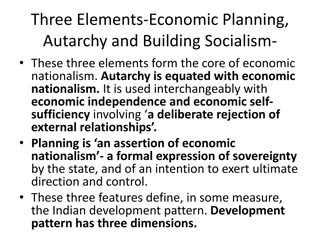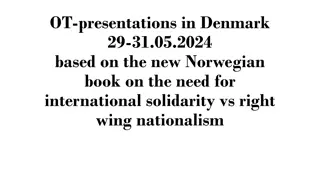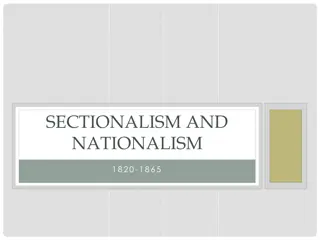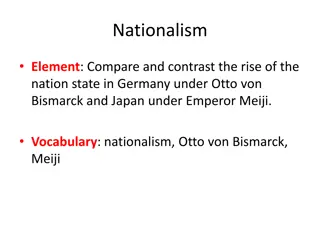Social Studies Notes : Ch. 22 & 23
Explore significant historical events and ideas such as nationalism, industrialism, and political reform. Learn about influential figures like Marie Curie, James Watt, and Simon Bolivar. Understand the impact of the Industrial Revolution and the French Revolution on society. Discover the connections
4 views • 30 slides
The Upsurge of Nationalism
The period of national unity and vibrant nationalism that emerged during Monroe's presidency, superseding partisan politics and shaping the future of the United States.
1 views • 39 slides
Understanding Nationalism: India's Road to Independence
Explore the journey of India towards independence, driven by the rise of nationalism under British colonial rule. Learn about key figures like Mohandas Gandhi and the Indian National Congress in the fight for equality and liberation. Discover the impact of nonviolent protests and the sacrifices made
0 views • 32 slides
Exploring Nationalism, Universalism, and Secularism in Education: Insights from Tagore and Krishnamurty
Delve into the profound concepts of nationalism, universalism, and secularism in education as elucidated by Dr. V. Regina, Principal at CSI Bishop Newbigin College of Education. The content explores the meanings, philosophies, and celebrations associated with these ideologies, drawing perspectives f
0 views • 22 slides
Nationalism Through the Ages: Exploring the Evolution of Nations
Delve into the concept of nationalism with Christoph Mick in the "Making of the Modern World" lecture series. From defining nations to discussing the importance of national character and heritage, explore how nationalism has shaped societies throughout history.
5 views • 32 slides
A.R. Desai: Contributions to Indian Nationalism and Sociology
A.R. Desai, a prominent figure in the field of sociology, made significant contributions to Indian nationalism and the study of society in India. His works focused on topics such as the social background of Indian nationalism, peasant movements, path of development, and Marxist democratic rights. De
5 views • 14 slides
Education for Citizenship in Indonesian Higher Education System
Education for Citizenship in Indonesian higher education aims to cultivate a sense of nationalism and love for the homeland among students. It focuses on developing students' awareness of being good citizens, promoting democracy, and nurturing a participatory attitude towards building a civil societ
5 views • 18 slides
Tiranga Game Online App | Tirangagameonline.in
With the help of the Tiranga Game online app, feel the excitement of nationalism. Visit Tirangagameonline.in to participate in the virtual celebration of India's customs and colors right now!\n\n\/\/tirangagameonline.in\/
5 views • 1 slides
Tiranga Online Game | Tirangagameonline.in
With the help of Tiranga Online Game, feel the excitement of nationalism. Take a look at Tirangagameonline.in right now to experience the essence of India!\n\n\/\/tirangagameonline.in\/
2 views • 1 slides
Rise of German Nationalism and Industrial Dominance in the 19th Century
German nationalism was bolstered by the Franco-Prussian War victory in 1871, leading to the emergence of the powerful German Empire. With iron and coal resources, a skilled workforce, and a focus on science and technology, Germany became the industrial giant of Europe. Chancellor Bismarck aimed to s
0 views • 12 slides
Characteristics of Fascism: A Detailed Examination
This detailed examination delves into the key characteristics of fascism, outlining how fascist regimes wield powerful nationalism, disregard human rights, identify enemies for unification, prioritize military supremacy, promote widespread sexism, control mass media, obsess over national security, a
0 views • 16 slides
The Development Pattern and Rationale Behind Economic Nationalism in India
Three core elements - economic planning, autarchy, and building socialism - define India's development pattern focused on self-sufficiency and state ownership of industries. The rationale behind this approach is debated between economic theory influences and Marxist perspectives, reflecting a commit
6 views • 14 slides
America's Entry into World War I: Causes and Impacts
World War I and the 1920s witnessed America's transition from neutrality to active involvement in the war. Factors such as nationalism, militarism, imperialism, and alliances led to the conflict. The impact of technological innovations resulted in stalemate on the Western Front, leading to significa
0 views • 11 slides
Threats to National Sovereignty in a Globalised World
National sovereignty faces threats in a globalised world due to factors like nationalism, westernisation, foreign ownership of companies, and disunity within nations. Issues such as challenges to national identity, consequences of disunity, and inequality caused by globalisation impact the stability
0 views • 4 slides
Evolution of the Nation-State and Modern State Concepts
The development of the nation-state marks a significant shift in political organization, characterized by centralized power, territoriality, and legitimacy gained through citizen support. Key innovations include territorial demarcation, monopolization of coercion, impersonal power structures, and th
0 views • 8 slides
Analysis of W.B. Yeats' Poem "The Second Coming" in Modern British and American Poetry
The analysis delves into the prominent themes of mortality, violence, and prophecy in W.B. Yeats' well-known poem "The Second Coming." Yeats' exploration of the idea of a Second Coming as a harbinger of a tumultuous future and his use of powerful symbols like the falcon and gyres showcase his distin
0 views • 8 slides
Approaches to the Causes of World War I: Historiography Overview
Explore various historical perspectives on the origins of World War I, from the blame placed on Germany in the Treaty of Versailles to the revisionist and anti-revisionist interpretations that emerged post-World War II. Delve into differing views on nationalism, imperialism, militarism, and alliance
0 views • 13 slides
Impact of the Indian Council Act of 1892 on Indian Nationalism
The Indian Council Act of 1892 was a significant step towards representative government in colonial India, increasing Indian representation in legislative councils. While it did not fully meet nationalist demands, it indirectly fueled revolutionary movements and calls for a more aggressive anti-Brit
0 views • 18 slides
World War I: Triggers and Ramifications
The causes of World War I, ranging from militarism and alliances to imperialism and nationalism, created a volatile environment in Europe. Nationalism led to heightened international rivalries, while militarism and an arms race added fuel to the fire. The quest for power, territory, and economic dom
0 views • 36 slides
Spanish-American War and American Expansionism: A Look Back in History
Explore the causes and impacts of the Spanish-American War, including the influence of Yellow Journalism, nationalism, and imperialism on American expansionism during the late 1800s. Learn about key figures like Theodore Roosevelt and the Rough Riders, and the significance of policies like the Monro
0 views • 25 slides
Celebrating World Bicycle Day: Azadi Ka Amrit Mahotsav
The Ministry of Youth Affairs and Sports, Government of India, is organizing the World Bicycle Day on 3rd June 2022 as part of Azadi Ka Amrit Mahotsav. The objective is to celebrate India's 75 years of independence, promote nationalism, and encourage cycling to address global warming and unhealthy l
0 views • 9 slides
The Rise of Nationalism in Europe: French Revolution and Revolutionary France
The rise of nationalism in Europe during the French Revolution and Revolutionary France era is explored, defining key terminologies like Absolutist Institutions, Utopian, Charter of the Rights of Man, Nation State, Modern State, and Multi-National Dynastic Empires. The French Revolution marked the f
1 views • 15 slides
Edward Said, Frantz Omar Fanon: Philosophy and Theory
Edward Said, a prominent figure in Middle Eastern studies, explored complex relationships between history, culture, politics, and academics. He challenged Western discourse through works like "Orientalism," sparking debate about power dynamics and identity. Said's insights on Palestine, nationalism,
0 views • 14 slides
Understanding Nationalism and Militarism in World War I
Explore the impact of nationalism and militarism in Europe during World War I through discussions on pride, alliances, and societal effects. Consider the dangers of excessive nationalism and how it led to conflict in the early 1900s.
0 views • 29 slides
Understanding the Impact of World War I on Global History
Delve into the multiple causes and effects of World War I, such as militarism, imperialism, nationalism, and alliances. Explore how the global scope of WWI shaped the 1920s and 1930s, leading up to World War II. Gain insights into key events and dynamics of this transformative period.
0 views • 97 slides
Understanding the Modern World: Conflict and Cooperation in Year 9 Revision
This revision material covers various aspects of conflicts and cooperation in the modern world, focusing on World War I and World War II. It discusses the causes of both wars, life changes during the wars, the rise of totalitarian governments, the Holocaust, British involvement in WWI, trench warfar
0 views • 10 slides
Orientalism and Imaginative Imperialism in the Arabian Nights
This content discusses the intertwining of Orientalism, imperialism, and literature in works like "A Thousand and One Nights" (The Arabian Nights). It explores how intellectual and cultural energies influenced the imperialist perspective and translation of these texts, revealing deeper insights into
0 views • 8 slides
Understanding Nationalism in Political Science
Nationalism, a complex concept, defines the nation as the fundamental unit of political rule. It encompasses a mix of objective and subjective factors, including cultural, ethnic, and political traits. The definition of a nation is subjective, based on how its members perceive themselves as a distin
0 views • 27 slides
Virtual Exhibit: The Era of Good Feelings - James Monroe Museum
Explore the virtual exhibit showcasing James Monroe's presidency, known as the Era of Good Feelings, a time of nationalism and political unity in the United States. Discover different aspects of Monroe's terms, from politics to treaties, to evaluate the era's significance.
0 views • 23 slides
Understanding Hindu Nationalism: From History to Contemporary Realities
Delve into the complexities of Hindu Nationalism through an exploration of its historical roots, contemporary manifestations, and the distinction between Hindutva and Hinduism. Explore key themes, readings, and debates surrounding the rise of Hindu Nationalism in India, shedding light on its implica
0 views • 15 slides
Nationalism in India and Southwest Asia: A Historical Overview
The aftermath of World War I led to a surge in nationalism in India and certain Southwest Asian countries, as empires like the Ottoman Empire and the British Empire showed signs of weakening. Indian nationalism grew due to factors such as promises of reform by the British, religious divisions, and e
0 views • 15 slides
Understanding Nations, Nationalism, and Their Emergence: A Comprehensive Overview
Explore the concept of nationhood, the evolution of nationalism, and the intricate relationship between cultural and political identities. Delve into the emergence of nations, the definition of a nation, and the complexities of cultural nations. Uncover historical examples, such as the Polish-Lithua
0 views • 15 slides
Struggles for Independence in India and Vietnam - A Historical Overview
The content highlights the movements for independence in India and Vietnam, focusing on key figures like Gandhi and Ho Chi Minh, events like the Rowlatt Act and Amritsar Massacre, and concepts like nationalism and civil disobedience. It also includes activities like creating timelines and analyzing
0 views • 33 slides
Economic Nationalism and Development Pattern in India
Economic nationalism in India was characterized by the elements of economic planning, autarchy, and socialism. The development pattern focused on capital goods industries, inward orientation, and state ownership. Two interpretations of this pattern were influenced by economic theory and Marxist pers
0 views • 13 slides
Analysis of Gender, Agency, and Nationalism in Feminist Ethnography
Explore the complexities of gender, agency, and Indian nationalism through feminist ethnography, delving into themes of family, silence, self-staging, and shifting identities. The analysis emphasizes the significance of women's agency in shaping their identities and resisting societal norms, highlig
0 views • 5 slides
International Solidarity vs. Right-Wing Nationalism: A Call for Global Unity
The upcoming presentations in Denmark are centered around a new Norwegian book emphasizing the crucial need for international solidarity to combat the rise of right-wing nationalism. The book sheds light on the shared responsibility of countries in addressing global crises, reiterates the importance
0 views • 15 slides
Understanding Sectionalism and Nationalism in 19th Century America
Explore the development of sectionalism and nationalism in the United States from 1820 to 1865, focusing on the differences between the North and South, the impact of industrialization and transportation on society, sources of unity and nationalism, and key Supreme Court cases strengthening the fede
0 views • 17 slides
Rabindranath Tagore: The Iconic Man of Letters and His Political Stand
Rabindranath Tagore, the Nobel Prize-winning poet, novelist, and painter, was a modernist humanist who criticized extremist nationalism. He founded Viswa Bharati University as a radical educational experiment. The context of his time, including the Jallianwala Bagh Massacre and the Swadeshi Movement
0 views • 15 slides
Global Distribution of Vaccines: Addressing Inequalities and Nationalism
The global distribution of Covid-19 vaccines highlights stark inequalities driven by manufacturing capacity saturation, nationalism, and unequal access. Vaccine diplomacy plays a crucial role, with countries like China, Russia, and India leveraging vaccines for strategic purposes. While vaccine riva
0 views • 12 slides
A Comparative Analysis of Nationalism: Bismarck's Germany vs. Meiji Japan
Explore the contrasting paths of nationalism in Germany under Otto von Bismarck and Japan under Emperor Meiji during the 19th century. Analyze how industrialization, consolidation of power, and other factors shaped their unique journeys towards nation-statehood.
0 views • 24 slides
